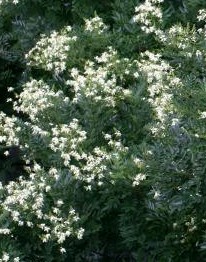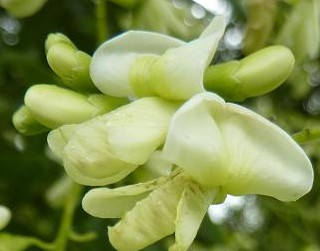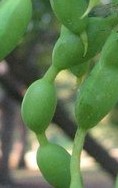 A native of China and Korea, the tree was brought to Japan, Europe, and North America where it is valued for its creamy white fragrant flowers that hang in clusters six to twelve inches long during the summer. The flowers are followed by long cream colored seed pods that turn yellow and then brown. The pods are three to eight inches long and are constricted between the seeds so that they look like a string of beads. The pinnately compound leaves go from bright to dark green and produce a light shade that allows grass and shade tolerant plants to grow beneath the tree. The tree is tolerant of pollution and is useful as a street tree as well as in parks, lawns, and garden settings. The pods, leaves, and flowers, however, can make a mess under the tree when they drop.
A native of China and Korea, the tree was brought to Japan, Europe, and North America where it is valued for its creamy white fragrant flowers that hang in clusters six to twelve inches long during the summer. The flowers are followed by long cream colored seed pods that turn yellow and then brown. The pods are three to eight inches long and are constricted between the seeds so that they look like a string of beads. The pinnately compound leaves go from bright to dark green and produce a light shade that allows grass and shade tolerant plants to grow beneath the tree. The tree is tolerant of pollution and is useful as a street tree as well as in parks, lawns, and garden settings. The pods, leaves, and flowers, however, can make a mess under the tree when they drop.
Type: Deciduous flowering tree
Outstanding Feature: Flowers in summer
Form: Upright, wide-spreading, broadly rounded crown
Growth Rate: Moderate to rapid
Bloom: Clusters of pea-like fragrant creamy white or yellow glowers in summer

Size: 50-70’ H x 50’ W
Light: Full sun to partial shade (in South)
Soil: Fertile, moist, well-drained
Hardiness: Zones 4-7
Care: Prune in fall
Pests and Diseases: Foliage pest resistant; susceptible to canker and twig kill in severe winters
Propagation: seed; grafting
Comments: The species and most cultivars take up to 25 years to bloom.
Outstanding Selections:
-
‘Princeton Upright’ (narrow; good for small gardens)
‘Pendula” (weeping; seldom blooms)
‘Regent’ (blooms in 6-8 years)
